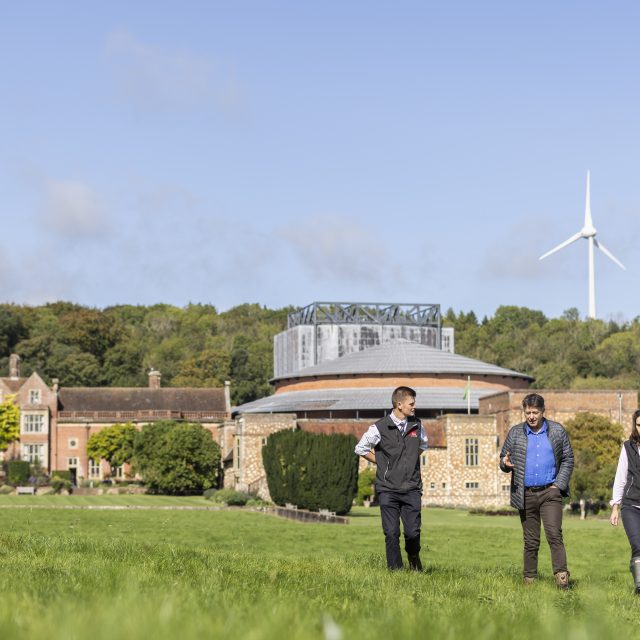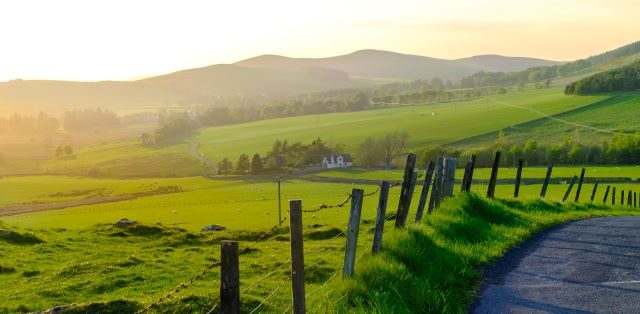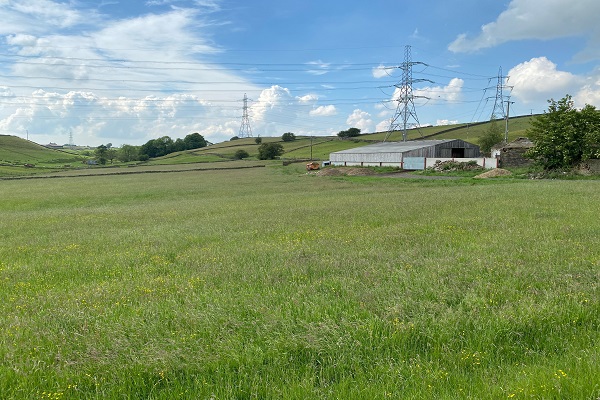Grant support for environmental enhancement (England)
The closure of key Government schemes like the Sustainable Farming Incentive (SFI) and Capital Grants has created uncertainty in the funding landscape for farmers and landowners.
These changes, along with the reductions in Basic Payment Schemes have left a gap in accessible agri-environmental funding at a time when demand for nature recovery and climate resilience is paramount.
However, a range of funding opportunities remains available to support the creation, restoration and enhancement of environmental features. Whether it is creating woodland, planting a hedgerow or creating species rich grassland, this guide outlines the opportunities currently available to landowners through the public or private sector.
Please note this information is correct at the time of writing (October 2025).
Nature, farming and landscape grants
Farming in Protected Landscapes
- For holdings in National Landscapes or National Parks.
- Up to 100% funding for projects supporting nature, climate, people and places.
- Projects must be completed by 31st March 2026.
- Read for more information on Farming in Protected Landscapes (FiPL).
Animal Health and Welfare
- For cattle, sheep or pig farmers.
- Covers vet visit for annual review and an endemic disease follow-up.
- Apply anytime, grant value depends on livestock type.
- Read for more information on Animal Health and Welfare grant funding.
Countryside Stewardship
Countryside Stewardship Higher Tier
- 5-20 year agreement for the creation and management of complex habitats.
- Applications opened in September 2025 by invitation only. Priority given to expiring 2024 or 2025 Higher Tier or Higher Level Stewardship (HLS) agreements, then those completing management plans, implementation plans and feasibility studies.
- More information can be found on the GOV.UK Countryside Stewardship Higher Tier page and via Defra’s recent blog post announcing the opening of the CSHT application window.
Countryside Stewardship Higher Tier Capital Grants
- 3-year grants supporting existing agreements.
- 40 capital items available for environmentally significant sites and woodlands.
- Discuss applications with Natural England before submitting, or Forestry Commission for woodland only applications.
- More information can be found on the Higher Tier Capital Grants page.
Plans available to support Countryside Stewardship agreements
PA1 Implementation Plans and PA2 Feasibility Studies
- PA1: £1,200 per plan to identify habitat restoration works.
- PA2: Up to 100% of costs covered for feasibility study.
- Works may include improving biodiversity, improving water quality, help with carbon capture, improved climate adaptation, enhancing priority habitats or improving the historic environment.
- Plans often used to inform Higher Tier applications.
- Read for more information on PA1 Implementation Plans and PA2 Feasibility Studies.
PA3 Woodland Management Plans
- Used to determine a 10-year management plan for woodland over 0.5 ha.
- Plans are a pre-requisite for woodland Higher Tier agreements.
- Payments depend on the size of woodland.
- Read for more information on PA3 Woodland Management Plans.
PA4 Agroforestry Plans
- Payment of £1,268.08 per plan.
- Can be used to help apply for capital funding for planting trees (once capital grants open) and for Higher Tier or Sustainable Farming Incentive (SFI) applications once the trees are planted.
- Read for more information on PA4 Agroforestry Plans.
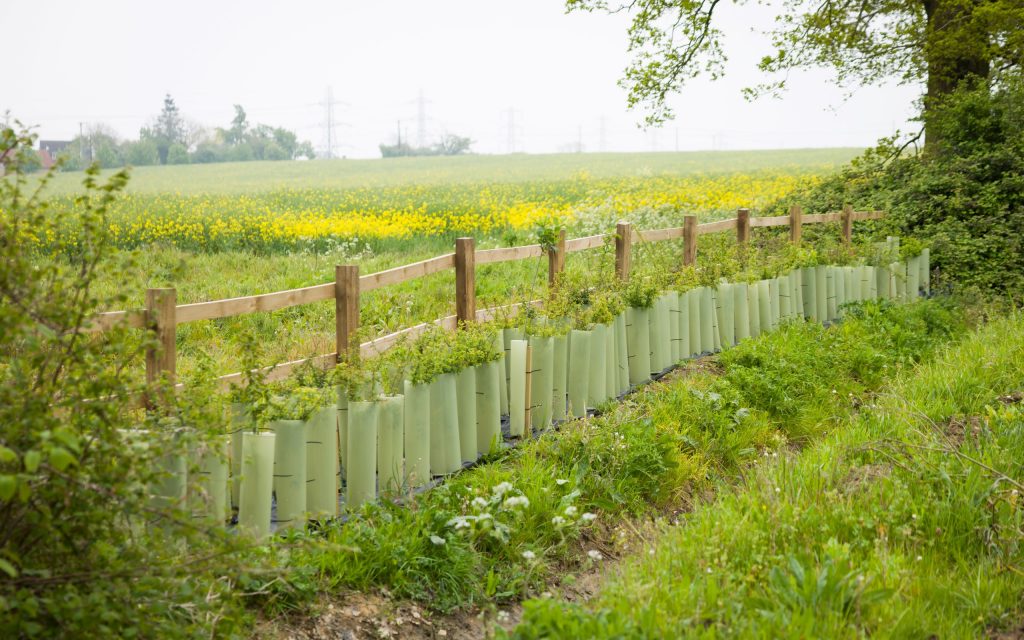
Woodland and Hedgerow Grants
England Woodland Creation Offer (EWCO)
- For new woodland 1ha and more.
- Up to £12,700 in stackable payments for delivering added benefits.
- Up to £10,200/ha for planting, plus £400/ha/year for 15 years maintenance.
- Applications open all year round.
- Area must not already be classified as woodland and not within an existing grant agreement (some exceptions).
- Read for more information on the England Woodland Creation Offer.
Woodland Creation Planning Grant (WCPG)
- For planning woodland creation of 5ha or more in England.
- Grant has two stages:
- Stage 1: £1,500 for desk-based constraints/opportunities review affecting the proposed planting.
- Stage 2: Covers site appraisal map, a design concept plan and UK Forestry Standard draft design plan.
- Read for more information on the Woodland Creation Planning Grant.
Woodland Tree Health Grant
- 3-year grant to restock/improve woodland after disease.
- Two grants:
- Restoration after felling.
- Improvement grant, for the removal of infected trees/rhododendron with Phytophthora ramorum, Phytophthora pluvialis or Phytophthora kernoviae.
- Applies to woodland 0.5ha or more.
- Read for more information on the Woodland Tree Health Grant.
National Highways 3 Million Trees Project
- Planting projects in England.
- Selection of tree species, with orders of between 2,500 – 50,000 whips available
- Further information and how to apply can be found at: National Highways 3 Million Trees Project – The Tree Council
Woodland Trust MOREWoods
- Covers up to 75% of costs for planting 500+ trees on at least 0.5ha if planting yourself.
- 60% of all costs covered if using a contractor to plant over 1ha.
- Includes trees, tree protection, visit and help with woodland design and species mix.
- 0.5ha can be made up of multiple smaller blocks of at least 0.1ha.
- Read for more information on the Woodland Trust MOREWoods scheme.
Woodland Trust MOREHedges
- Covers up to 75% of the cost for planting 100 metres or more of hedgerow and allowing 1 tree every 6m to grow.
- Funding covers the trees, tree protection and expert advice.
- At least 100 metres of hedging must be planted in a single run and connect with:
- at least 0.2 hectares of existing or newly planted woodland (0.1ha in Scotland), or
- woodland via established hedgerows within 500m of the new hedge.
- Read for more information on the Woodland Trust MOREHedges scheme.
Western Forest (Bristol, Bath and North-East Somerset, North Somerset and South Gloucestershire)
- Up to 100% of your project costs covered and up to 15 years of establishment payment
- Tree planting projects include:
- Woodland – No maximum size, minimum of 0.1ha per block planting
- Orchard – 0.1ha or more, approximately 15 fruit trees on vigorous rootstock (non commercial)
- Wood Pasture – 0.1ha upwards. At least 3 trees per 0.1ha
- Hedgerows – New hedges, 100m minimum length
- Natural Regeneration and Colonisation
- Includes planning assessments, design and logistics
- Further information at: Grants to plant trees on your land in the Forest of Avon – Forest of Avon
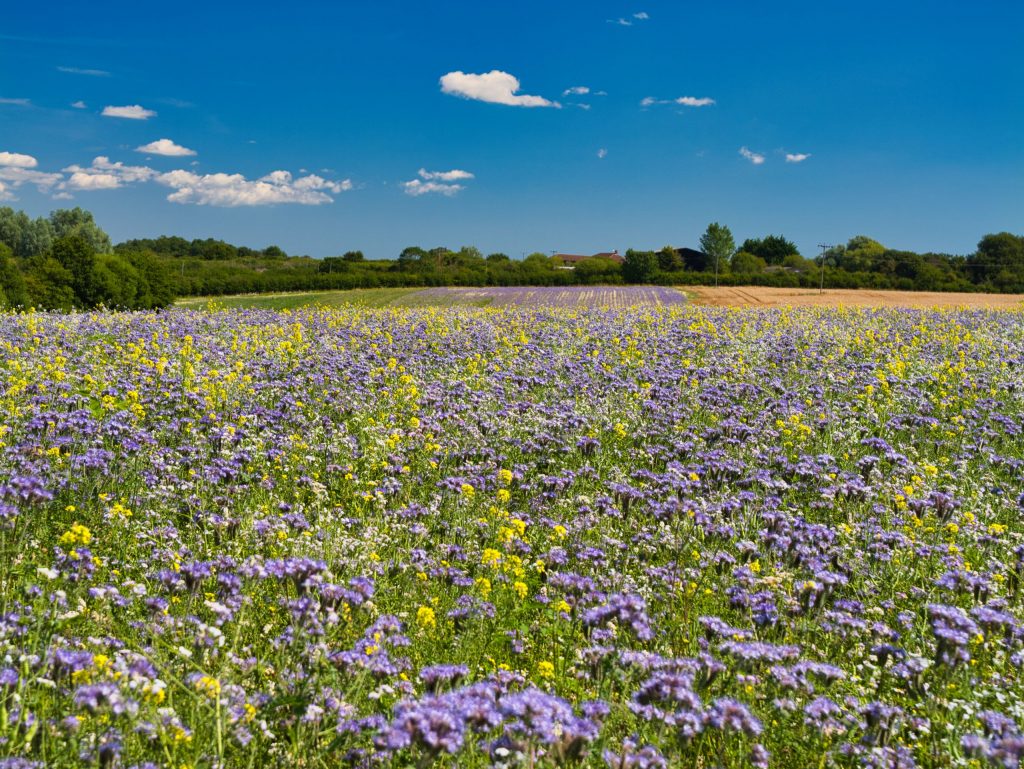
Water Company Schemes
Anglian Water – East of England.
- Series of grants available including:
- Farmer Training Grant – 50% funding towards the cost of attending a course, event or workshop which is related to water protection and/soil health. Maximum grant of £600.
- Event Grant – Up to £1,000 available for planning an event related to land management or soil health which improves water quality.
- Farming Innovation Grant – Aimed at supporting new and innovative projects to find solutions for water quality issues such as herbicides, nitrates, phosphates and soil loss. Maximum grant of £7,500 per holding. This grant scheme is closed for 2025.
- Further information on all grants available at: Supporting farmers to care for rivers.
Bournemouth Water – Bournemouth and surrounding areas.
Upstream Thinking
- Catchment management scheme covering the Bournemouth area catchment which applies natural solutions to reduce the agricultural impact on biodiversity and water quality.
- Activities include:
- Installing waterside fencing
- Building ponds
- Improving farm tracks
- Increasing slurry storage
- Planting trees and buffer strips to catch and filter water.
- Further information available at Nature-based solutions | Environment | Bournemouth Water.
Portsmouth Water – Portsmouth and surrounding areas.
- Nitrate Intervention Payment for Ecosystem Services (PES) Schemes
- Payments to deliver measures that aim to reduce nitrate leaching and improve farming. efficiency e.g. cover crops, herbal leys and nutrient management plan.
- Scheme runs until March 2026. Grants capped at £10k per year per holding.
- Scheme information can be found at: Grants for Farmers | cleanwater
- Biodiversity Grant Scheme
- Grant for environmental improvement projects such as re-coppicing woodland and wetland creation, invasive non-native species control, species and habitat surveys and equipment purchase.
- Application scheme currently closed. Opening again in Spring 2026.
- Further information: Biodiversity Grant Scheme | cleanwater.
- Capital Grant Scheme
- Closed for 2025. Opens again Spring 2026.
- To stay informed see Grants for Farmers | cleanwater.
Severn Trent Water – Midlands, from the outskirts of Sheffield, down to Bristol, and into north and mid-Wales.
- Farming for Water Programme works directly with farmers to deliver environmental solutions to protect river health and drink water quality.
- An array of grants available, all information available at: Farming for water | Working with farmers and land managers | Environment | About Us | Severn Trent Water
South East Water – South East of England.
- Capital Grant Scheme available to reduce agricultural diffuse pollution.
- Grants available of up to 50% of the cost with a maximum of £15,000 for capital items and up to £10,000 for land management. Total of £25,000 available.
- Further information at Capital Grants | South East Water
South West Water – Cornwall, Devon, the Isles of Scilly and parts of Dorset and Somerset.
Upstream Thinking
- Catchment management scheme covering the Exe catchment which applies natural solutions to reduce the agricultural impact on biodiversity and water quality.
- Activities include:
- Installing waterside fencing
- Building ponds
- Improving farm tracks
- Increasing slurry storage
- Planting trees and buffer strips to catch and filter water
- Read for further information on the Upstream Thinking scheme.
SES Water – Surrey, Kent and South London.
- Financial support available for farmers in SES Water’s target areas to help protect water quality at source.
- The initiatives SES Water currently funds can be found at Biodiversity | SES Water.
Wessex Water – South West of England.
- Phosphorus Reduction Scheme
A grant scheme offering financial support and advice to farmers for adopting practices that reduce Phosphorus inputs, prevent soil erosion and buffer watercourses from Phosphorus pollution.
- Somerset
- Read for further information on payment rates and measures in the Tone, Parrett and Yeo Phosphorus Reduction Scheme.
- Dorset
- Read for further information on payment rates and measures as part of the River Stour Phosphorus Reduction Scheme.
_______________________________________________________________________________________
Green finance
- Private finance funding is available through opportunities such as Biodiversity Net Gain, Nutrient Neutrality, Woodland and Peatland Carbon Codes.
- Emerging opportunities include soil carbon and flood risk reduction, and soil carbon credit schemes.
- These schemes usually require long term commitment and planning.
_______________________________________________________________________________________
Other funding not currently open
Sustainable Farming Incentive (SFI)
- Government grant which pays land managers to take up or maintain land management practices that protect and benefit the environment, support food production and improve productivity.
- 3-year agreement
- Currently closed for applications, expected to open again in 2026.
- Read for further information on the SFI.
Capital Grant
- Standalone grant to fund one-off capital items, based on boundaries, water and air quality and natural flood management. 78 capital items available.
- Funding limits in place of:
- Air quality – £25,000 maximum
- Boundaries – £35,000
- Natural Flood Management – £25,000
- Water quality – £25,000
- 3 years to complete the works.
- Currently closed for applications, expected to open again in 2026. Read for more details of the Capital Grants Scheme.
Landscape Recovery
- Part of the Environmental Land Management (ELM) schemes, specifically designed to support ambitious, large-scale projects that restore nature and enhance biodiversity across extensive areas of land. These projects involve collaboration among farmers, landowners, environmental organisations and local communities to create tailored plans that address local environmental needs.
- Existing projects continue as planned
- Further round expected in future.
- Read Defra’s recent blog post on progress in the implementation of Landscape Recovery.
Farming Equipment and Technology Fund
- A grant to help buy items that improve productivity, manage slurry and improve animal health and welfare.
- Currently closed for applications.
- Read for further information on the Farming Equipment and Technology Fund (FETF).
Rewilding Britain – Rewilding Challenge Fund
- £100,000 awarded to one large-scale rewilding project each year
- Projects must be:
- Based in England, Wales or Scotland
- Part of/eligible to join Rewilding Britain’s Rewilding Network
- At least 1,000ha/10 km² in size (the majority of which is contiguous and proposed for rewilding)
- Closing date was 10 October 2025, but the scheme will reopen in 2026.
- More information available at Rewilding Challenge Fund | Rewilding Britain
Tree Council – Grant funding to support tree, hedgerow and orchard establishment
- Network Rail Community Tree Planting Fund
- Grants of between £2,500 and £10,000 for projects in England, Scotland and Wales.
- Currently closed for applications.
- Further information and to register interest for Round 2 can be found at Network Rail Community Tree Planting Fund – The Tree Council
- SP Energy Networks Community Tree Planting Fund
- Grants of between £2,500 and £10,000 for projects in Scotland only.
- Currently closed for applications.
- Further information and to register interest for Round 2 can be found at SP Energy Networks Community Tree Planting Fund – The Tree Council
Affinity Water – North and West London and the surrounding Home Counties.
- Rooting for Wildlife Scheme – Closed for 2025/26 applications.
- Funding to address biodiversity, prioritising riparian zones, areas within designated sites and supporting key habitats and species of conservation concern. Multi-stakeholder applications are also encouraged as combining interests, resources and capabilities will improve environmental outcomes.
- More information: Apply for our Rooting for Wildlife scheme.
Cambridge Water – Cambridge, extending to Ramsey in the North, Gamlingay in the West, Balsham in the Wast and Melbourn in the South.
- PEEBLE Fund (Projects that Explore Biodiversity Benefits in the Local Environment).
- Funding of up to £10,000 for projects that look to improve, restore or create habitat.
- Applications closed 29 September 2025. Further rounds expected.
- Further information PEBBLE Fund | South Staffs Water.
Essex & Suffolk Water – Essex and Suffolk area.
- Branch Out Fund – Environmental fund for applications of up to £10,000 which supports projects that reconnect habitats for the benefit of people and wildlife.
- Applications closed 13 October 2025.
- Further information: Branch Out.
Northumbrian Water – North East England.
- Branch Out Fund – Environmental fund for applications of up to £10,000 which supports projects that reconnect habitats for the benefit of people and wildlife.
- Applications closed 13 October 2025.
- Further information: Branch Out.
South Staffs Water – West Midlands, South Staffordshire, South Derbyshire, North Warwickshire and North Worcestershire areas.
- PEEBLE Fund (Projects that Explore Biodiversity Benefits in the Local Environment)
- Funding of up to £10,000 for projects that look to improve, restore or create habitat.
- Applications closed 29 September 2025. Further rounds expected.
- Further information PEBBLE Fund | South Staffs Water.
Strutt & Parker has a team of natural capital advisors who support farmers and landowners wanting to make environmental enhancements by finding investment from public and private sources. If you would like help in accessing any of the schemes highlighted in this article then please contact Lauren Clarke who is based in our Exeter office and has over 15 years of experience in both the agricultural and environmental sectors, with 13 years working as a farm environment advisor. During this time, Lauren has advised on and submitted over 200 agri-environment schemes applications and provided habitat management advice to landowners. If you would like to talk more generally about realising the value of your natural capital assets contact Gwilym Jenkins, Head of Natural Capital (England) or Joel Paterson, Head of Natural Capital (Scotland).

